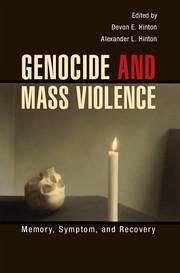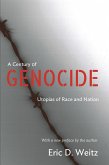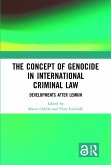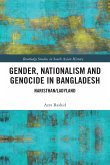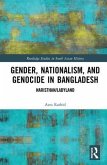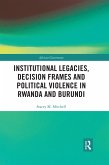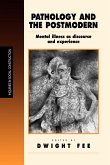Genocide and Mass Violence
Memory, Symptom, and Recovery
Herausgeber: Hinton, Devon E; Hinton, Alexander L
Genocide and Mass Violence
Memory, Symptom, and Recovery
Herausgeber: Hinton, Devon E; Hinton, Alexander L
- Gebundenes Buch
- Merkliste
- Auf die Merkliste
- Bewerten Bewerten
- Teilen
- Produkt teilen
- Produkterinnerung
- Produkterinnerung
Genocide and Mass Violence brings together a unique mix of anthropologists, psychiatrists, psychologists and historians to examine the effects of mass trauma.
Andere Kunden interessierten sich auch für
![A Century of Genocide A Century of Genocide]() Eric D. WeitzA Century of Genocide32,99 €
Eric D. WeitzA Century of Genocide32,99 €![Genocide in the Modern Age Genocide in the Modern Age]() Zachary A KarazsiaGenocide in the Modern Age209,99 €
Zachary A KarazsiaGenocide in the Modern Age209,99 €![The Concept of Genocide in International Criminal Law The Concept of Genocide in International Criminal Law]() The Concept of Genocide in International Criminal Law202,99 €
The Concept of Genocide in International Criminal Law202,99 €![Gender, Nationalism, and Genocide in Bangladesh Gender, Nationalism, and Genocide in Bangladesh]() Azra RashidGender, Nationalism, and Genocide in Bangladesh66,99 €
Azra RashidGender, Nationalism, and Genocide in Bangladesh66,99 €![Gender, Nationalism, and Genocide in Bangladesh Gender, Nationalism, and Genocide in Bangladesh]() Azra RashidGender, Nationalism, and Genocide in Bangladesh180,99 €
Azra RashidGender, Nationalism, and Genocide in Bangladesh180,99 €![Institutional Legacies, Decision Frames and Political Violence in Rwanda and Burundi Institutional Legacies, Decision Frames and Political Violence in Rwanda and Burundi]() Stacey MitchellInstitutional Legacies, Decision Frames and Political Violence in Rwanda and Burundi66,99 €
Stacey MitchellInstitutional Legacies, Decision Frames and Political Violence in Rwanda and Burundi66,99 €![Pathology and the Postmodern Pathology and the Postmodern]() Dwight Fee (ed.)Pathology and the Postmodern82,99 €
Dwight Fee (ed.)Pathology and the Postmodern82,99 €-
-
-
Genocide and Mass Violence brings together a unique mix of anthropologists, psychiatrists, psychologists and historians to examine the effects of mass trauma.
Hinweis: Dieser Artikel kann nur an eine deutsche Lieferadresse ausgeliefert werden.
Hinweis: Dieser Artikel kann nur an eine deutsche Lieferadresse ausgeliefert werden.
Produktdetails
- Produktdetails
- Verlag: Cambridge University Press
- Seitenzahl: 448
- Erscheinungstermin: 17. November 2014
- Englisch
- Abmessung: 229mm x 155mm x 30mm
- Gewicht: 794g
- ISBN-13: 9781107069541
- ISBN-10: 1107069548
- Artikelnr.: 41611651
- Herstellerkennzeichnung
- Libri GmbH
- Europaallee 1
- 36244 Bad Hersfeld
- gpsr@libri.de
- Verlag: Cambridge University Press
- Seitenzahl: 448
- Erscheinungstermin: 17. November 2014
- Englisch
- Abmessung: 229mm x 155mm x 30mm
- Gewicht: 794g
- ISBN-13: 9781107069541
- ISBN-10: 1107069548
- Artikelnr.: 41611651
- Herstellerkennzeichnung
- Libri GmbH
- Europaallee 1
- 36244 Bad Hersfeld
- gpsr@libri.de
Foreword: what does trauma do? Arthur Kleinman; Introduction: an
anthropology of the effects of genocide and mass violence: memory, symptom,
and recovery Devon E. Hinton and Alexander L. Hinton; Part I. Private and
Public Memory: 1. The Vietnam War traumas Heonik Kwon; 2. Haunted by Aceh:
specters of violence in post-Suharto Indonesia Byron J. Good; 3.
Remembering and ill health in post-invasion Kuwait: topographies,
collaborations, and mediations Conerly Casey; 4. 'Behaves like a rooster
and cries like a (four-eyed) canine': the politics and poetics of
depression and psychiatry in Iran Orkideh Behrouzan and Michael M. J.
Fisher; 5. Embodying the distant past: Holocaust descendant narratives of
the lived presence of the genocidal past Carol A. Kidron; 6.
Half-disciplined chaos: thoughts on contingency, story, and trauma Vincent
Crapanzano; Part II. Symptom and Syndrome: 7. 'The spirits enter me to
force me to be a communist': political embodiment, idioms of distress,
spirit possession, and thought disorder in Bali Robert Lemelson; 8.
'Everything here is temporary': psychological distress and suffering among
Iraqi refugees in Egypt Nadia El-Shaarawi; 9. Key idioms of distress and
PTSD among rural Cambodians: the results of a needs-assessment survey Devon
E. Hinton, Alexander L. Hinton and Kok-Thay Eng; 10. Attack of the
grotesque: suffering, sleep paralysis, and distress during the Sierra Leone
war Doug Henry; Part III. Response and Recovery: 11. The chaplain turns to
God: negotiating post-traumatic stress disorder in the American military
Erin Finley; 12. Acehnese women's tales of traumatic experience,
resilience, and recovery Mary-Jo Delvecchio Good; 13. Rwanda's Gacaca
trials: toward a new nationalism or business as usual? Christopher C.
Taylor; 14. Pasts imperfect: talking about justice with former combatants
in Colombia Kimberly Theidon; 15. Atrocity and nonsense: the ethnographic
study of dehumanization Alexandra Pillen; 16. Growing up on the frontline:
coming to terms with war-related loss in Gonagala, Sri Lanka Kenneth E.
Miller and Sulani Perera; 17. The role of traditional rituals for the
reintegration and psychosocial well-being of child soldiers in Nepal
Brandon Kohrt; Commentary: wrestling with the angels of history: memory,
symptom, and intervention Laurence J. Kirmayer.
anthropology of the effects of genocide and mass violence: memory, symptom,
and recovery Devon E. Hinton and Alexander L. Hinton; Part I. Private and
Public Memory: 1. The Vietnam War traumas Heonik Kwon; 2. Haunted by Aceh:
specters of violence in post-Suharto Indonesia Byron J. Good; 3.
Remembering and ill health in post-invasion Kuwait: topographies,
collaborations, and mediations Conerly Casey; 4. 'Behaves like a rooster
and cries like a (four-eyed) canine': the politics and poetics of
depression and psychiatry in Iran Orkideh Behrouzan and Michael M. J.
Fisher; 5. Embodying the distant past: Holocaust descendant narratives of
the lived presence of the genocidal past Carol A. Kidron; 6.
Half-disciplined chaos: thoughts on contingency, story, and trauma Vincent
Crapanzano; Part II. Symptom and Syndrome: 7. 'The spirits enter me to
force me to be a communist': political embodiment, idioms of distress,
spirit possession, and thought disorder in Bali Robert Lemelson; 8.
'Everything here is temporary': psychological distress and suffering among
Iraqi refugees in Egypt Nadia El-Shaarawi; 9. Key idioms of distress and
PTSD among rural Cambodians: the results of a needs-assessment survey Devon
E. Hinton, Alexander L. Hinton and Kok-Thay Eng; 10. Attack of the
grotesque: suffering, sleep paralysis, and distress during the Sierra Leone
war Doug Henry; Part III. Response and Recovery: 11. The chaplain turns to
God: negotiating post-traumatic stress disorder in the American military
Erin Finley; 12. Acehnese women's tales of traumatic experience,
resilience, and recovery Mary-Jo Delvecchio Good; 13. Rwanda's Gacaca
trials: toward a new nationalism or business as usual? Christopher C.
Taylor; 14. Pasts imperfect: talking about justice with former combatants
in Colombia Kimberly Theidon; 15. Atrocity and nonsense: the ethnographic
study of dehumanization Alexandra Pillen; 16. Growing up on the frontline:
coming to terms with war-related loss in Gonagala, Sri Lanka Kenneth E.
Miller and Sulani Perera; 17. The role of traditional rituals for the
reintegration and psychosocial well-being of child soldiers in Nepal
Brandon Kohrt; Commentary: wrestling with the angels of history: memory,
symptom, and intervention Laurence J. Kirmayer.
Foreword: what does trauma do? Arthur Kleinman; Introduction: an
anthropology of the effects of genocide and mass violence: memory, symptom,
and recovery Devon E. Hinton and Alexander L. Hinton; Part I. Private and
Public Memory: 1. The Vietnam War traumas Heonik Kwon; 2. Haunted by Aceh:
specters of violence in post-Suharto Indonesia Byron J. Good; 3.
Remembering and ill health in post-invasion Kuwait: topographies,
collaborations, and mediations Conerly Casey; 4. 'Behaves like a rooster
and cries like a (four-eyed) canine': the politics and poetics of
depression and psychiatry in Iran Orkideh Behrouzan and Michael M. J.
Fisher; 5. Embodying the distant past: Holocaust descendant narratives of
the lived presence of the genocidal past Carol A. Kidron; 6.
Half-disciplined chaos: thoughts on contingency, story, and trauma Vincent
Crapanzano; Part II. Symptom and Syndrome: 7. 'The spirits enter me to
force me to be a communist': political embodiment, idioms of distress,
spirit possession, and thought disorder in Bali Robert Lemelson; 8.
'Everything here is temporary': psychological distress and suffering among
Iraqi refugees in Egypt Nadia El-Shaarawi; 9. Key idioms of distress and
PTSD among rural Cambodians: the results of a needs-assessment survey Devon
E. Hinton, Alexander L. Hinton and Kok-Thay Eng; 10. Attack of the
grotesque: suffering, sleep paralysis, and distress during the Sierra Leone
war Doug Henry; Part III. Response and Recovery: 11. The chaplain turns to
God: negotiating post-traumatic stress disorder in the American military
Erin Finley; 12. Acehnese women's tales of traumatic experience,
resilience, and recovery Mary-Jo Delvecchio Good; 13. Rwanda's Gacaca
trials: toward a new nationalism or business as usual? Christopher C.
Taylor; 14. Pasts imperfect: talking about justice with former combatants
in Colombia Kimberly Theidon; 15. Atrocity and nonsense: the ethnographic
study of dehumanization Alexandra Pillen; 16. Growing up on the frontline:
coming to terms with war-related loss in Gonagala, Sri Lanka Kenneth E.
Miller and Sulani Perera; 17. The role of traditional rituals for the
reintegration and psychosocial well-being of child soldiers in Nepal
Brandon Kohrt; Commentary: wrestling with the angels of history: memory,
symptom, and intervention Laurence J. Kirmayer.
anthropology of the effects of genocide and mass violence: memory, symptom,
and recovery Devon E. Hinton and Alexander L. Hinton; Part I. Private and
Public Memory: 1. The Vietnam War traumas Heonik Kwon; 2. Haunted by Aceh:
specters of violence in post-Suharto Indonesia Byron J. Good; 3.
Remembering and ill health in post-invasion Kuwait: topographies,
collaborations, and mediations Conerly Casey; 4. 'Behaves like a rooster
and cries like a (four-eyed) canine': the politics and poetics of
depression and psychiatry in Iran Orkideh Behrouzan and Michael M. J.
Fisher; 5. Embodying the distant past: Holocaust descendant narratives of
the lived presence of the genocidal past Carol A. Kidron; 6.
Half-disciplined chaos: thoughts on contingency, story, and trauma Vincent
Crapanzano; Part II. Symptom and Syndrome: 7. 'The spirits enter me to
force me to be a communist': political embodiment, idioms of distress,
spirit possession, and thought disorder in Bali Robert Lemelson; 8.
'Everything here is temporary': psychological distress and suffering among
Iraqi refugees in Egypt Nadia El-Shaarawi; 9. Key idioms of distress and
PTSD among rural Cambodians: the results of a needs-assessment survey Devon
E. Hinton, Alexander L. Hinton and Kok-Thay Eng; 10. Attack of the
grotesque: suffering, sleep paralysis, and distress during the Sierra Leone
war Doug Henry; Part III. Response and Recovery: 11. The chaplain turns to
God: negotiating post-traumatic stress disorder in the American military
Erin Finley; 12. Acehnese women's tales of traumatic experience,
resilience, and recovery Mary-Jo Delvecchio Good; 13. Rwanda's Gacaca
trials: toward a new nationalism or business as usual? Christopher C.
Taylor; 14. Pasts imperfect: talking about justice with former combatants
in Colombia Kimberly Theidon; 15. Atrocity and nonsense: the ethnographic
study of dehumanization Alexandra Pillen; 16. Growing up on the frontline:
coming to terms with war-related loss in Gonagala, Sri Lanka Kenneth E.
Miller and Sulani Perera; 17. The role of traditional rituals for the
reintegration and psychosocial well-being of child soldiers in Nepal
Brandon Kohrt; Commentary: wrestling with the angels of history: memory,
symptom, and intervention Laurence J. Kirmayer.

